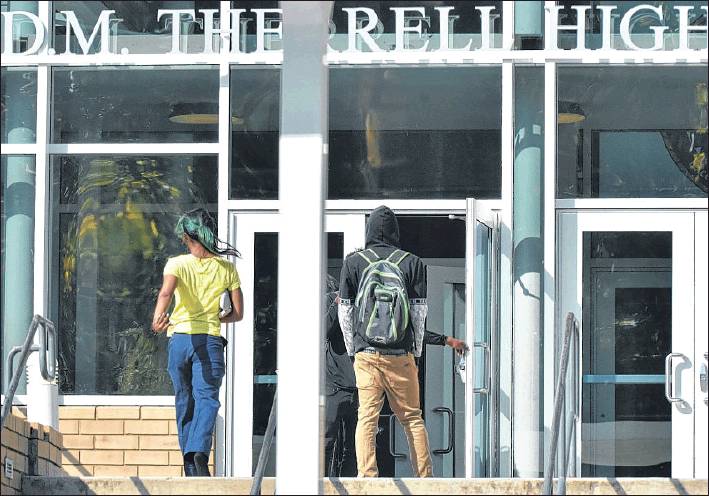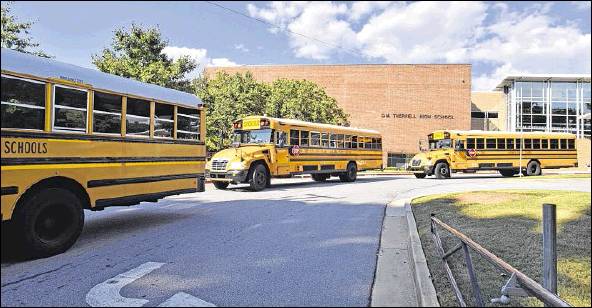IN YOUR SCHOOLS
Help comes for kids in cheating scandal
Tutoring, counseling, social services part of APS’ $18M program.
By Molly Bloom molly.bloom@ajc.com
By the time Atlanta Public Schools got serious about fixing the legacy of a districtwide cheating conspiracy, half of the victims were already gone — dropped out, moved away, graduated.
The other half, about 3,000 kids, are now the target of a 6-year, $18 million program to make up for educators “helping” students bubble in the right answers on state tests.
On average, students who were likely victims of cheating ended up slightly behind other students in their schools in reading and writing, with the gap roughly equivalent to having had a rookie teacher rather than an experienced one for a year or two, Georgia State researchers found.
With children in higher-poverty Atlanta schools significantly more likely to be taught by inexperienced teachers because of long-standing inequities in the city’s schools, thousands of other Atlanta children likely experienced similar gaps — even without anyone giving them test answers.
But in Atlanta the memory of the cheating scandal still looms large, and the symbolism of an effort to atone for it may be as significant as any results so far.
That effort, which combines tutoring, counseling and social services, ran through about $2.6 million before it fully launched this year. And the extra help it provides leaves out hundreds of children likely affected by cheating; it’s only open to children whose test answer sheets showed high rates of wrong-to-right erasures in the single year state investigators confirmed cheating, even though former Atlanta educators say cheating went on for years before then.
Still, even those critical of the program say at least Atlanta Public Schools is trying.
“We’re trying to make up for all the things that we didn’t do for years and years and years,” said Shawnna Hayes-Taveres, an Atlanta parent who has spoken out about the cheating for years and is a member of the advisory board for the program.
The program is a signal from Atlanta’s superintendent and school board that they’re different than the people who ran Atlanta schools during the cheating.
“If we do it right, if we do it well ... it will help us rebuild the integrity of Atlanta Public Schools,” Superintendent Meria Carstarphen said last year in announcing the program, called Target 2021 after the year in which eligible students are expected to graduate.
Perception pushed good student
Paul Askew, now a junior at Jackson High School, attended Peyton Forest Elementary School, whose improbable one-year transformation from one of the worst schools in the state to one of the best was made possible by teachers changing test answers and sharing copies of state tests among themselves to “prepare” students, state investigators found.
Paul never needed anyone to cheat for him, his mother, Kim Askew, said, “He was able to hold his own before that and during that and after that,” she said.
The cheating wasn’t something Paul noticed at the time. It’s not something he’s thought much about since. If anything, it made him work harder.
“My teachers showed ... that they thought I didn’t know, so it made me push myself more,” he said.
Today, he earns mostly A’s and B’s and is on track to graduate with special recognition for community service and academics. Still, when a counselor told him this year he was eligible for extra help because of the cheating at his elementary school, he thought, why not?
“I was like, yeah, I might take this as an advantage to myself,” he said.
Through the Target 2021 program, he’s racking up community service hours and attending after-school tutoring in math, his weakest subject. The counselor who oversees the program at Jackson has become a “school mom” for him and other students.
“There’s not anything that I wasn’t getting,” before Target 2021, he said. “But it’s better because I’m getting more.”
For many students who were likely cheated for, the main effects were limited to reading and writing, Georgia State researchers found in an Atlanta Public Schools-commissioned analysis of several years of student test scores and other data.
On average, in the years after the cheating was uncovered, students whose state test answer sheets showed high rates of wrong-to-right erasures ended up about a quarter to a half year behind other students in reading and writing in schools where cheating took place, Georgia State researchers found. That’s after taking student demographics into account.
The cheating didn’t seem to have widespread, significant effects on math performance or how often students missed school or got in trouble at school, the researchers found. And not every student enrolled in schools where cheating took place was likely to have had test answers changed.
Help’s not all academic
At Therrell High School, Target 2021 counselor Sonja Mangham says that there isn’t much that sets her students apart from their peers.
M a n g h a m w o r k s f o r Communities in Schools of Atlanta, one of two groups the district hired to do most of the Target 2021 work.
Communities in Schools, a branch of a national nonprofit, puts counselors like Mangham in schools to figure out what help students need and make sure they get it. A for-profit company, Boston-based consulting company Public Consulting Group, provides tutors.
A previous tutoring program started soon after the cheating was uncovered was open to any student interested.
Mangham said some of her students have asked why they’re in Target 2021.
But “They don’t come to me and say ‘My teacher erased my answer so I’m having this problem,’” she said.
Some students come to her office when they’re hungry, drawn to her stash of fruit cups and granola bars. Some need help getting clothes or other essentials or access to a computer for homework. Some just come in for a hug in the morning.
She helps them write weekly goals — like bringing up a course grade — and celebrates with them when they meet them.
The most common thing they need is lessons in how to ask for help, she said. For many, the idea of going to a teacher and asking for makeup work or a review of a tough concept is daunting.
“Just yesterday a goal for one of the students was to go to the teacher to say, ‘I don’t understand this, can you help?’” she said.
Slow start
It took more than a year from the time Atlanta Public Schools announced Target 2021 in spring 2015 for all eligible students to start getting help.
As late as May 2016, Atlanta’s top academic officer, Olivine Roberts, said the program was “still in its infancy” and “experiencing implementation challenges.”
It’s hard to tell if the program is making a difference.
Communities in Schools officials point to things like the number of students who received individual plans for extra help and the number of Target 2021 students who graduated or were promoted to the next grade as signs of the program’s success. But school district officials said data on how Target 2021 students performed compared to the previous year or to other Atlanta students is not yet available. A full evaluation of the program is expected to be complete by early next year.
Shawnna Hayes-Tavares, who has two children who are or were eligible for Target 2021, is frustrated at the gaps she’s seen in communicating with families about Target 2021 and in connecting students with the program’s services.
L ast school year, her daughter, then a senior at North Atlanta High School, was offered test preparation help through Target 2021 just two weeks before her final ACT attempt — and only after Hayes-Tavares, who leads a district family advocacy group, repeatedly asked for help.
Target 2021’s time frame and implementation “fall short,” she said.
“For six years we still have not been able to grab hold of this situation and impact these students in a positive way,” she said. “I’m impatient with Atlanta Public Schools because I’ve watched them drag their feet on too many things.”

